MercoPress. South Atlantic News Agency
Tag: National party
-
Monday, June 30th 2025 - 10:33 UTC
Delgado chosen to chair Uruguay's National Party

Former presidential candidate Álvaro Delgado was elected chairman of Uruguay's National Party (PN) board of directors this weekend, narrowly defeating fellow Senator Javier García by 202 votes to 184 amid boos blaming him from the recent loss to President Yamandú Orsi. Luis Alberto Heber and Carlos Enciso received 45 and 33 votes, respectively.
-
Monday, May 12th 2025 - 10:59 UTC
Uruguay’s municipal elections: National Party dominates, Frente Amplio retains Montevideo
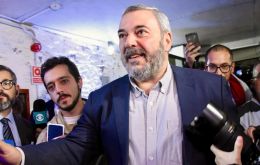
Uruguay’s 2025 municipal and departmental (provincial) elections concluded with results reinforcing the country’s traditional political landscape. The left-wing Frente Amplio retained its stronghold in Montevideo and Canelones, while the center-right National Party (Partido Nacional) maintained its dominance across most rural regions, securing a total of 13 departments.
-
Monday, November 25th 2024 - 11:19 UTC
Yamandú Orsi elected President of Uruguay, marking left's return to power

Uruguay has elected Yamandú Orsi of the Frente Amplio (FA) as its next president, bringing the left back to power after five years of conservative rule. Orsi secured 49.8% of the vote against 45.9% for Álvaro Delgado of the National Party, a margin of 92,000 votes, according to official results. The outgoing president, Luis Lacalle Pou, promptly congratulated Orsi, stating he was ready to facilitate a smooth transition.
-
Friday, June 28th 2024 - 10:56 UTC
Uruguay’s internal elections: Key players and possible outcomes

As the internal elections for Uruguay’s major political parties approach next Sunday, the consulting firm Opción Consultores has released a public opinion report evaluating the potential impact of voter turnout on the outcomes for the Frente Amplio (FA), Partido Nacional (PN), and Partido Colorado (PC). The report, released this Thursday, provides a detailed analysis of how varying levels of voter participation could influence the percentage of votes each pre-candidate might receive.
-
Tuesday, May 30th 2023 - 10:24 UTC
Uruguayan Senator against synthetic meat

Uruguayan Senator Sebastián Da Silva (National Party) will push for the banning of the manufacture and import of artificial or laboratory meat because “Uruguay, as a cattle-raising country, has to be a pioneer in the fight against this type of laboratory protein, artificial, and must defend the real natural food,” it was reported in Montevideo.
-
Monday, August 30th 2021 - 08:31 UTC
Uruguayan President Lacalle Pou not keen on a 2nd term in 2029

Uruguayan President Luis Lacalle Pou said that “in 2029 I should be old” and downplayed his possible attempt at a new term in office. That year he will turn 56.
-
Tuesday, December 3rd 2019 - 09:50 UTC
Uruguay president elect hopes pragmatism prevails over ideology in Mercosur
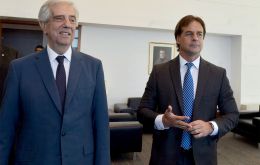
Mercosur faces a tense future, the president-elect of Uruguay said on Monday, referring to a diplomatic spat between regional heavyweight economies Brazil and Argentina. Brazil’s right-wing leader Jair Bolsonaro and Argentina’s incoming leader, left-leaning Peronist Alberto Fernandez, have sparred openly.
-
Friday, November 29th 2019 - 09:58 UTC
Uruguay's incumbent candidate salutes president elect Lacalle Pou; transition talks begin next Monday
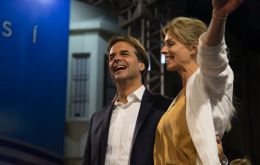
Luis Lacalle Pou of the center-right National Party won Uruguay’s presidency after his rival conceded four days after a runoff election. A second vote count by the country's Electoral Court confirmed and widened the neck to neck difference between the president elect and the incumbent candidate
-
Monday, November 25th 2019 - 09:59 UTC
Uruguay's presidential runoff results delayed because of the very tight results
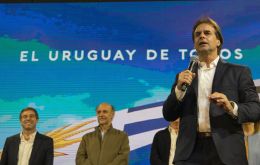
Uruguay Sunday's presidential runoff results have been so tight that the Electoral Court will only make a definitive announcement sometime late this week after it has completed counting all votes, including some 34.000, classified as “observed”. This is because the difference between the two candidates is some 29.000 votes.
-
Saturday, November 23rd 2019 - 09:59 UTC
Uruguay Sunday's presidential runoff, a multicolor power switching with strong winds of change
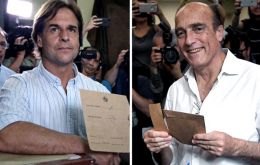
This Sunday 2.7 million Uruguayans will cast their ballots in the presidential runoff, which according to all opinion poll forecasts, will have Luis Lacalle Pou, the leader of an opposition multicolor alliance as head of the Executive next March, but equally significant, power switching, it will mark the end of fifteen years of almost undisputed predominance of a catch-all coalition, Broad Front, which ruled South America's smallest country for three consecutive five-year mandates.
